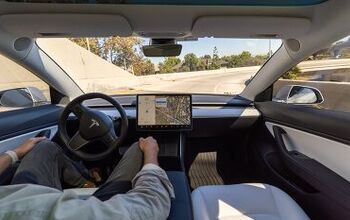Brainstorm! Decrease Traffic by Removing Roadways!
According to Erica Barnett over at WorldChanging.com, the recent lane closures on Seattle's I-5 failed to create a highly anticipated traffic snarl. In fact, half of the usual 120k per day traffic simply "disappeared." This led Ms. Barnett to the only possible conclusion: eliminating roadways is an excellent way to reduce traffic! How's that again? "Drivers are adaptable. When faced with the prospect of gridlock—and given ample warning and time to prepare—people found alternate routes, rode transit, worked from home, and avoided unnecessary trips." That doesn't sound too bad at all! In fact, it sounds great! To be fair, Barnett is not entirely insensitive to the Pollyanna factor. "For congestion-as-incentive to work in the long term, it has to be paired with alternatives that are viable in the long term– flexible work schedules that allow workers to stay home a few days a week, mass transit that is affordable, frequent, and convenient, and an infrastructure that supports bike and pedestrian commuting, among other things." Yes, well, meanwhile, she says if King County Metro had provided more buses during the lane closures, they could have rendered the lanes unnecessary. Huh.
More by Robert Farago


































Comments
Join the conversation
Hey! Let's ban cars while we're at it too! That'll take care of that pesky traffic problem once and for all!
What the article didn't state was that all the anticipated traffic on I-5 moved over to I-405 on the other side of the lake and jammed up Bellevue instead. People are pretty adaptive creatures (most of the time). If they know there's going to be a problem somewhere, they either avoid it or look for ways to solve it. Just because the problem didn't show up as anticipated doesn't mean it isn't there. It might have just shifted somewhere else.
"Americans are smart and fiercely proud of their country and I sincerely believe that if our governments at the local, state and federal level made serious commitments to improving the state of transit, if we prioritized transit over road construction in the spending of tax revenues, that city-dwelling Americans would take advantage of it." The problem there is that most of us live in the suburbs. Low density living is poorly compatible with mass transit. If we don't live en mass, it's hard to see how we could travel en mass. Understandably, most suburbanites will be oppossed to spending tax dollars on a system they'll rarely (if ever) use.
I must remember to join worldchanging to compliment Ms. Barnett on her talent; it takes real talent to write a story this divorced from reality. Of course, it helps when you have already decided the outcome of the piece. I work in Seattle. Everyone has been dreading the I-5 work. As a result, roughly 20% of the people I work with have gone on vacation. Others are working from home one day a week (which the company has only allowed during the period of the work) or have made other arrangements. My boss timed his surgery - which has a three week recovery period - to coincide with the I-5 work. I got lucky - I live well North of the work (in Kirkland), so it hasn't impacted me. It goes without saying that none of these techniques are sustainable over the long term. Of course, given her conclusions, perhaps they don't go without saying.